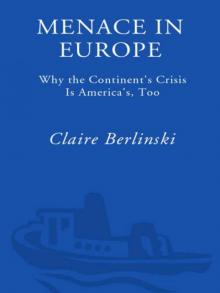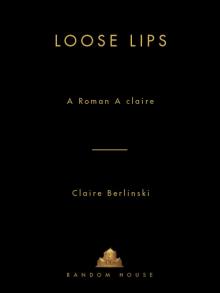- Home
- Claire Berlinski
Lion Eyes
Lion Eyes Read online
LION EYES
CONTENTS
Title Page
Dedication
Epigraph
Preface
ONE PARIS
Chapter One
Chapter Two
Chapter Three
TWO ISTANBUL
Chapter Four
Chapter Five
Chapter Six
THREE BACK IN PARIS, AGAIN
Chapter Seven
Chapter Eight
Chapter Nine
Chapter Ten
Epilogue
Acknowledgments
Note On the Persian Poetry in Lion Eyes
About the Author
Also by Claire Berlinski
Copyright
For my mother and my father
And to the memory of Peter,
my little Fu Manchu
Although the sun shines bright,
Though nothing stirs in sight,
When traversing the desert
Do not forget your gun.
Although the plain stretched wide,
Good men before have died,
Who failed to see a lion
Curled sleeping in the sun.
—SA‘DI
PREFACE
Shortly after writing my first novel, Loose Lips, I began corresponding with the Lion. Within days of our first exchange of e-mails, I was fascinated. Within months, I was obsessed.
I then discovered that the Lion was not who I imagined him to be.
The story that follows is my attempt to reconstruct, to my own satisfaction, how I—an intelligent, well-educated, professional woman in my thirties—fell so powerfully in the thrall of a man I knew only through an epistolary exchange.
PARIS
Or don’t you like to write letters. I do because it’s such a swell way to keep from working and yet feel you’ve done something.
—ERNEST HEMINGWAY
CHAPTER ONE
. . . It’s more than a little obvious that Selena Keller is Claire Berlinski, or maybe it’s her sister. The title page has “A Roman à Claire” written under the title, which leads me to believe the fetching drink of water that’s described by Ms. Berlinski in the book is actually the author herself, even though I’ve been assured it’s not. Did Berlinski dip her toe into the Central Intelligence Agency? Go to the Farm? Get trained for work in the CST unit of the CIA? . . .
—FRANK BASCOMBE,
book critic, writing about Loose Lips
I don’t drink,” said Jimmy, when on our first date I suggested we order a bottle of wine; and I wasn’t so blind that I didn’t immediately appreciate, particularly given the tattoos on his arms and his ethnic background, that the words meant I’m working the steps. But he was handsome, in a rough, ruined way, and he had swagger. There was something disarming about his smile, too—so disarming, in fact, that when my cranky and suspicious ninety-two-year-old grandmother visited my family in Paris, she fell for Jimmy as well. He gently helped her up and down the stairs and conversed intently with her about James Joyce and Edna O’Brien. He brought her his beaten-up copy of Angela’s Ashes. She read it in one sitting and said the descriptions of hunger and poverty reminded her of her own upbringing in wartime Germany.
Angela’s Ashes has a lot to answer for, actually. When our affair began, shortly after I arrived in Paris, he read the book to me out loud. Och, aye! He had a superb gift for mimicry and a working-class Belfast accent, so it was hard not to confuse him with the characters in the book and easy to ascribe to him all the book’s wit and sensitivity—a confusion he did nothing to dispel by noting, repeatedly, the analogies between his own life and Frank McCourt’s.
He was a former boxer. He had grown up during the Troubles and had seen awful things. He was tough and streetwise. He had a tender Irish sentimentality, and he loved books. If he did not seem particularly ambitious or driven, I reckoned that an appealing quality: I had dated many men who were, and would not have been sorry never again to feign interest in my date’s aggressive business plan for the penetration of the competitive Finnish telecom sector. It was fine with me if Jimmy taught English lessons and did odd jobs for a living. I figured there was only room for one big ego in a couple. I was right about that, I think; I just didn’t realize that there were, in fact, two in ours.
I would have been well advised to pay more attention to Angela’s Ashes.
A few weeks after we broke up, I ran into him by accident up by Montmartre. I was satisfied by the way he looked at me. He had just purchased a motorcycle from a bass player who was going back to Manchester. The attraction was still there, unfortunately, and when he offered to give me a lift back to my apartment, judgment failed me once again, and I accepted, even though generally I never ride motorcycles, for all the obvious reasons. Before he even pulled out into the street, he miscalculated the distance between my hip and the car parked beside us. It made an awful sound, like tongs being fed into a Cuisinart.
When I returned from the emergency room to my empty apartment, on crutches, even the narcotics I’d been prescribed for the pain did nothing to relieve my sense of desolation.
That was the way I was living when the first letter from the Lion arrived, and that, I think, explains a lot.
• • •
I wrote Loose Lips in Paris, where I live now. My apartment is on the top floor of a brick building overlooking the Place Dauphine. It is physically impossible to live closer to the heart of Paris. I can’t say that I’m close to my neighbors, however. The elderly Hungarian woman who lives below me once sent an official registered letter to my landlord, informing him that I had placed my garbage bags on the landing instead of taking them down to the basement Dumpster. She is sensitive to noise. She has complained that I run my bathtub too loudly. Below her lives the man with an incontinent Irish setter. No amount of lavender air freshener will ever make the elevator right again.
The concierge and his wife live on the ground floor. Monsieur Tubert has an incomprehensible Provençal accent and the sly face of a village grocer who puts his finger on the scale. I speak to him only when my hot water stops working. Whenever I ring his bell to tell him this, Madame Tubert, wearing a stained housecoat, opens the door just a crack. A cloud of ancient dust billows from the apartment. After appraising me suspiciously for a good long time, she relays the bad news to her husband, who slowly levers himself erect and wheezes upstairs with his tool belt. He inevitably spends four hours in my apartment, taking apart the plumbing, leaving parts all over the floor, sighing, and muttering incomprehensibly to himself before declaring that it’s bien foutu and calling the plumber.
The linden trees on the Place Dauphine are elegant in the winter; in the spring they explode into exuberant buds. This summons the local workmen in their blue coveralls, who come to the plaza to shake each other’s hands for a good half hour and play pétanque all afternoon. Young lovers sit on the benches, kissing each other on the eyelids and earlobes and cooing tenderly.
The restaurants on the Place Dauphine look so inviting, with their belle époque painted storefronts and their outdoor tables. The waiters write the day’s menus on chalkboard easels in that careful round cursive they teach in French schools, and at lunchtime the tables fill up with plump, well-appointed attorneys and their mistresses. The women wear leather pants and carry unhappy small dogs; everyone smokes furiously. The food comes stacked in artful little pyramids: galettes of this and confits of that, all drizzled with a coulis of something-or-other and served in the summer with a cold Sancerre.
My L-shaped studio is not spacious. The stumpy little half bathtub has a hose in place of a shower, and the alley to the minifridge between the cupboard and the sink is almost impassable. But from my windows I see all of Paris, from the Eiff
el Tower to the Pantheon. I see the Palais de Justice, the spires of Sainte-Chapelle, and the banks of the Seine. The cobblestones on the plaza glow when it rains, reflecting honey-colored light from the wrought-iron street lamps. At night, I watch the sun set over the rooftops of Paris as the glittering Bateaux Mouches churn serenely down the river, leaving phosphorescent ripples in their wake.
It’s quite a glamorous life, except for one thing. Sometimes I go for days hearing only one human voice. It emerges from my laser printer, solemnly informing me in a mechanical British accent that the printing has started and the printing has finished.
• • •
Before moving to Paris, I worked as a democracy officer in the Elections and Political Processes sector of the Department of Agriculture’s Foreign Agricultural Service. I had originally moved to Washington in the hope of finding work with a think tank, or perhaps as a staffer on the Hill. I took the job with the USDA because I wanted to be posted overseas. “Do you have a yen for travel, a passion for agriculture, and enthusiasm for international trade?” asked the department’s website. I had a yen for travel. What more could they want? But after accepting the job, I found myself sitting in a windowless office in Washington, preparing a series of briefing papers on electoral systems in the developing world.
My father had moved to Paris several years before. A year after taking the job in Washington, I came to visit him over the winter holidays. He had just finished writing another book, and on the last day of my visit, I said wistfully, “I wish I could quit my job and move to Paris and be a writer, too.”
“Why can’t you?” he asked.
Why couldn’t I?
Begin with a voice, everyone says; finding one was hardly my problem. The voice that I heard never shut up. The first time I heard it was the day I moved into my apartment complex in Washington. I was in the lobby, fumbling with the key to my new mailbox, when a door slammed several flights above me and a voice, rapid-fire and insistent, began to echo down the stairwell. I couldn’t make out what the woman was saying, but she was surely saying a lot of it. The voice began descending from the top to the ground floor, accompanied by the chattering click of high heels. The babbling and clicking grew louder. There was a sudden pause in both the heel clicking and the babble as for a moment she stopped to listen to someone; then a resumption of clacking and jabbering, then a crescendo of clacking and jabbering, and then at last a leggy, slender black woman burst into the lobby, a bright yellow scarf tied elegantly around her head and fixed above her forehead with a glittering brooch. “Hold on one sec,” she said to the cell phone cradled between her cheek and shoulder. “Well hiya, new neighbor,” she said to me as if she’d known me for years. “Welcome to the building. I mean, you must be my new neighbor; I saw all your boxes. You need a hand with those? I’ll drop by when I get back.” Without waiting for me to answer, she returned her attention to the cell phone and began babbling again. Still talking, she gave the mailbox next to mine a vigorous karate chop with the side of her hand. It flew open. She pulled from it a stack of letters, flyers, brochures, and postcards; leafed through them quickly; and shoved them back in her mailbox. She opened the last letter and—still talking—quickly skimmed the contents. She squinted and frowned. “Dang it, he didn’t even proofread it.” She balled up the paper and tossed it over her shoulder. “Gotta run, honey,” she said to me, “but I’ll drop by later and say hello to you proper.” And with that, she pranced off, leaving a cloud of babble in her wake.
I had not said one word.
Some prurient instinct prompted me to pick up the piece of paper she had just tossed to the ground. I smoothed it, checking furtively to make sure no one saw me snooping. “Charlene, FYI” was written by hand at the top of the page.
FOR IMMEDIATE RELEASE
LAWSUIT SEEKS TO CHALLENGE CIA’S
CENSORSHIP OF FORMER BLACK OFFICER’S MEMOIRS
Washington D.C.—Charlene Pierce, an African-American who is suing the Central Intelligence Agency (CIA) for racial discrimination, today filed a new lawsuit in the United States District Court for the District of Columbia challenging the CIA’s decision to censor her memoirs. Formerly employed as a CIA Clandestine Service Trainee (CST), Ms. Pierce asserts the CIA is abusing the classification system to defeat her discrimination lawsuit.
I looked at the label on the mailbox she had just opened. It read c. pierce.
I looked behind me again, puzzled.
Later that evening, my mysterious new neighbor dropped by with an apple cake. “Hey there! I’m Charlene, and I just wanted to be neighborly; I’m from North Carolina and that’s what we do. You need any help with all those boxes?” I opened my mouth to thank her but didn’t get past the first syllable. “Hey, you have a better living room than mine! Can I step in for a sec?”
I thought I had happened earlier upon a secret, or at least something private, but I was quite mistaken. It took her no more than fifteen minutes to tell me that she was suing the CIA and that they had fired her, ostensibly for her indiscretion but really, she claimed, “because they’re a big bag of shitbag racist jerks.” She had been relieved of her position when the agency’s security officers, tipped off by an anonymous informant, caught her sending e-mail to her sister describing the skills she was acquiring in spy school where she had been training to become a CIA case officer. “You know, like how to do land navigation? With a compass? Which is nasty, by the way. Out there in the woods with ten billion mosquitoes, and chiggers, and gnats, and bats, and poison ivy, and poison oak, poison you name it, and these ticks that have what’s-that-disease? That gives you a rash? And these things in the woods made noises; oh, man, it was nasty. So I told my sister, you know? But talking about chiggers—that’s no big deal. That stuff’s all on the Internet anyway. Lots of white folks at the CIA do things just as bad as talking to their sisters about chiggers. Happens every day. They don’t get fired. They get some damned administrative warning.”
I supposed.
Charlene and I palled around a lot that year, and I don’t believe she was ever once silent. Much as I was charmed by her and wanted to take her side, I could see exactly why they had fired her. “Hey, do you want to read my memoirs?” she asked me one evening as we shared a bottle of wine on her balcony. “They’re technically still classified, but I know I can trust you.” She had known me for three weeks.
Of course I accepted—who wouldn’t? The manuscript was not particularly well written, but it described the CIA’s secret training program in great detail. What intrigued me most was her account of her downfall. She suspected that her jealous boyfriend, another CIA trainee, had turned her in after snooping through her mail, looking for evidence of her infidelity.
The CIA never let Charlene publish her memoirs, but they didn’t go to waste.
• • •
So there I was in Paris with a voice in my head put to rest. Loose Lips had just been published. I was still moping about Jimmy. And then the thermometer began to rise. The canicule, the great European heat wave of 2003, had begun, and by the time it was over it had claimed 35,000 lives.
The proximate cause of the canicule was an anti-cyclone that had anchored itself stubbornly over the European landmass, holding back rain from the Atlantic Ocean and permitting hot, dry air to be conveyed over the Mediterranean from the North African desert. Indeed, Paris felt like a desert, not only because the heat was blistering and dry but because the light, refracted through the haze of dust and pollution, made the landscape shimmer and turned the skyline reddish brown.
At the flower stall, the blossoms hung limply; the long-stemmed roses drooped over the sides of their buckets. Nearby, the ordinarily voluble merchants stood quiet and motionless by their vegetable displays, their clothes damp and their hair lank against their skulls. No one was making pleasantries, particularly not the waiters in the outdoor cafés. They refused defiantly to wear lightweight clothes, filling buckets of ice and pouring gallon upon gallon of Coke and Ricard, all the
while wearing long-sleeved starched white shirts, black trousers, formal black leather shoes, and fully lined waistcoats. Rivers of sweat poured from their temples. They smelled rank and sour, even from a distance. The fish and the fruit stalls stank to high heaven. Even the produce in supermarkets was rotten and mushy.
The neighborhood winos stripped to their underwear and sprawled half naked on the streets, too exhausted even to beg for spare change. Two blocks from my apartment, businessmen swam in the Seine and children splashed in the Châtelet fountain among the sphinxes and the statues. This was, generally speaking, not done, and ordinarily, nothing so troubles the Parisian soul as the sight of children doing something that’s not done, particularly if they look as if they’re enjoying it. But no one was stopping them or admonishing them. Even the old ladies were too hot to get exercised.
My apartment was directly below a corrugated metal roof. I had no fan; in another triumph of French capitalism, every fan in Paris had been sold out. I spent the canicule moving slowly between my bathtub, where I lay in cool water reading for hours—my leg, still not quite right after the accident, poking out and braced against the wall—and my computer, where I sat in my underwear, a wet towel around my back like a cape. I did no work; I gave in to abject laziness. I surfed the Internet and listened to broadcasts of This American Life while desultorily playing a devilishly addictive computer game called Snood. I have to admit that at first there was something pleasant about it, something dreamy and languid. It was a moment outside of time, as if Paris had been merged with some dusty, one-horse Mexican border town.
By the eighth day of the canicule, the heat—the highest recorded in the northern hemisphere since 1757—was drying rivers, shriveling crops, warping railway tracks, decimating livestock, melting the glaciers of the Alps, and setting forests throughout Europe ablaze. The elderly and infirm were dying at a prodigious rate. Mortuaries in Paris were unable to cope with the overflow, and the authorities were forced to commandeer a disused farmer’s market on the outskirts of the city to store the mounting pile of bodies. The tone of the headlines had changed from amused to concerned to frantic. (Zoo Bears Snack on Mackerel Ice Cream. Europe Broils. No Relief in Sight. Killer Heat Wave Continues. Catastrophe Exposes French Health Care Crisis. Heat Wave Threatens French Nuclear Reactors. Pope Leads Prayers for Rain.) The temperature in my apartment reached 110 degrees, then 112, then 116. At night I slept on the cool tiled floor of my kitchenette. No one in Paris had air-conditioning—summers here are not usually particularly warm—and tempers were frayed. Everyone’s windows were open, and we could all hear one another’s voices, televisions, arguments: Couples screamed at each other through the night. Of course I was dying for the heat to break, but some small part of me, relishing the extremity of it all, perversely urged the mercury upwards: Could it go higher?Higher still?

 Lion Eyes
Lion Eyes Menace in Europe: Why the Continent's Crisis Is America's, Too
Menace in Europe: Why the Continent's Crisis Is America's, Too Loose Lips
Loose Lips There is No Alternative
There is No Alternative